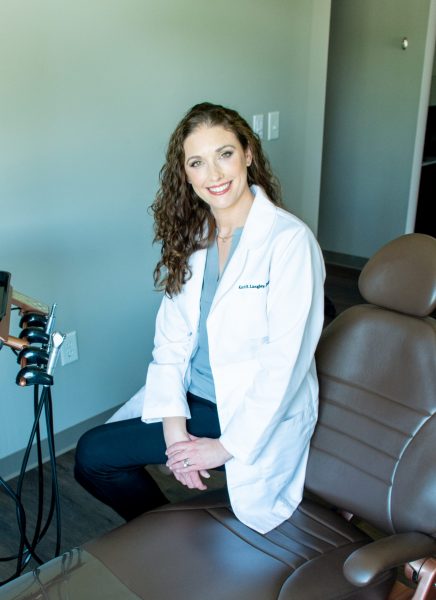Solutions for overcoming dental fear
At Langley Dental Care, our goal is to make sure you are as comfortable as possible. If you have a fear of dental work or you suffer from dental anxiety, we offer two forms of minimal sedation: inhaled sedation and oral sedation. When under minimal sedation, you will be awake, but relaxed.
Dental anxiety is not uncommon. In fact, some studies show that up to 75% of Americans experience some level of dental related fear and 20% avoid dental care because of it. If you have a fear of dental work, we want you to know that making you feel comfortable and safe at our office is our first priority.

Dental anxiety vs. Dental phobia
Dental anxieties and phobias present themselves in a wide variety of ways, and specific fears vary from person to person. Dental anxiety may be mild to moderate, and often takes the form of a general sense of worry and apprehension when thinking about an upcoming procedure. Dental phobia is a more intense experience, with patients feeling an overwhelming, irrational fear of dental work. This can sometimes cause them to avoid care all together.
Langley Dental Care can help you get the care you need.
Inhaled minimal sedation
If you choose to use inhaled minimal sedation, you will breathe nitrous oxide through a mask that’s placed over your nose. As you breathe the nitrous oxide, you will begin to relax. Inhaled minimal sedation often wears off quickly, so you don’t need to worry about feeling groggy for the rest of the day.
Nitrous oxide
Nitrous Oxide is a sweet-smelling, non-irritating, colorless gas which you can breathe.
Nitrous Oxide has been the primary means of sedation in dentistry for many years. Nitrous oxide is safe, the patient receives 50-70% oxygen with no less than 30% nitrous oxide.
The patient is able to breathe on their own and remain in control of all bodily functions.
The patient may experience mild amnesia and may fall asleep, not remembering all of what happened during their appointment.
If you choose to use inhaled minimal sedation, you will breathe nitrous oxide through a mask that’s placed over your nose. As you breathe the nitrous oxide, you will begin to relax. Inhaled minimal sedation often wears off quickly, so you don’t need to worry about feeling groggy for the rest of the day.
There are many advantages to using nitrous oxide
- The depth of sedation can be altered at any time to increase or decrease sedation.
- There is no after effect of feeling groggy.
- Inhalation sedation is safe with no side effects on your heart and lungs, etc.
- Inhalation sedation is very effective in minimizing gagging.
- It works rapidly as it reaches the brain within 20 seconds. In as little as 2-3 minutes its relaxation and pain killing properties develop.
- You can drive home after nitrous safely leaves your system.

Oral minimal sedation
For oral minimal sedation, you simply take a pill before your procedure. The pill will cause drowsiness, but you’ll likely still be awake. With either form of minimal sedation, you’ll truly be able to relax in the dentist’s chair.
Anti-anxiety pills
The most commonly prescribed dental related drugs that treat anxiety belong to the “benzodiazepine” family. Drugs such as Valium, Halcion, Xanax, or Ativan. These drugs decrease anxiety by binding and toning down activity within “fear” receptors in the brain.
There are two different types of benzodiazepines:
- Sedative-Hypnotics: These drugs induce calm, including drowsiness and even sleep. This sleep state is actually a form of hypnosis which is a form of physiological sleep.
- Anti-Anxiety Drugs: These are drugs which relieve anxiety and induce a state of calm and relaxation.
While benzodiazepines act as sedatives AND anti-anxiety drugs, some are highly targeted at areas within the brain which focus on sleep. Others act in a more specific way and target fear centers in the brain. In most cases, higher doses act as sedatives and induce sleep, while in lower doses, they reduce anxiety without sedation.
Benzodiazepines are also Central Nervous System (CNS) depressants (i.e. there can be a decline in blood pressure and breathing). It is important to note that they shouldn’t be mixed with other CNS depressants such as alcohol. Its important that you utilize the dose your dentist or doctor recommends. It is possible to overdose, and overdoses could lower your breathing to dangerously low levels, which could result in coma or death.
Please note that you shouldn’t travel on your own after you’ve taken any of these drugs. Make sure you have an escort, even if you traveled by bus or foot! It’s easy to become disorientated.
We can help
Whatever your individual level of anxiety may be, our office is committed to making sure that your visit is as comfortable, quick and easy as possible. There are many solutions for dental anxiety, and we are ready to help.
Here are a few popular methods for easing anxiety in the dental office:

Communication
Informing us as to what you are afraid of is a great place to start. Often we can quell a fear simply by giving you correct or updated information. We will always keep you informed before, during and after your procedure, making sure that you understand what is going on and why we are doing it.

Calming Techniques
Many patients find it helpful to practice controlled breathing or to find distraction inside the room.

Listening to Music
With most procedures, the use of personal headphones and music is allowed. This is a great way to keep calm and pass the time while in the chair.

Taking Breaks
Let us know if you would like to take a short break during your treatment by signaling with your left hand.
